Calling History: Listen In on Conversations with History’s Most Influential People.
The Calling History Podcast is an unscripted, interview style phone conversation with the heroes, the villains, and the great thinkers of history. It’s an opportunity to ask them anything, in their time, while they are living it. How did Benjamin Franklin feel about leaving his comfortable life of fame and excess in London as a loyal British citizen to risk it all and return to America as a rebel? How did record setting Louise Thaden feel about racing and beating Amelia Earhart and yet her name is almost unknown? Who is Jack the Ripper and why did he enter the scene so violently and then disappear like a whisper? Subscribe now and join this entertaining, interesting, and unpredictable journey back in time as we learn who these people really were and answer the question, “If you could call anyone in history, what would you ask them?”
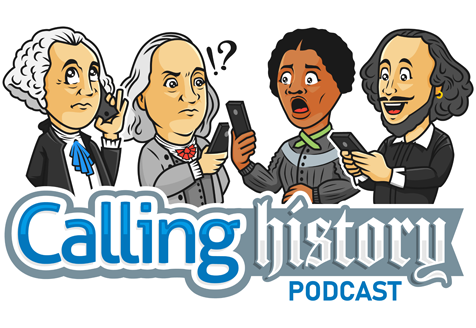
You’re Invited to Listen in on a Conversation with History's Most Interesting People.
Episodes
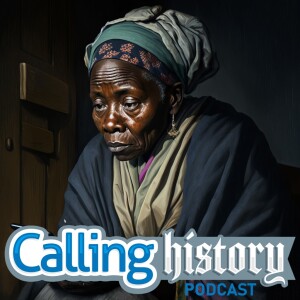
Wednesday Feb 08, 2023
Wednesday Feb 08, 2023
In Part 2 of the 1903 phone conversation with Harriet Tubman I make a huge mistake, you’ll know it when I say the word ‘chaos’. She will also tell us:
About the conductor that ripped up her train pass and then broke her arm.
The difference between the regular Bible and the Slave Bible. I had to look this up, it’s real!
And finally, she’ll share the thing she wants to do next. It will make you smile.
Start episode 2 and join the conversation.
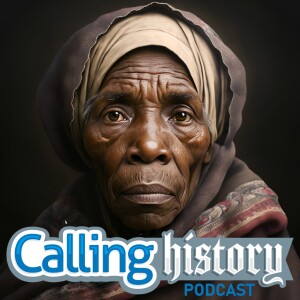
Wednesday Feb 01, 2023
Wednesday Feb 01, 2023
In 1903, while sitting in her home in Auburn, New York at the age of 81, Harriet Tubman received a call from the future …
Few have accomplished so much after starting with so little. Harriet Tubman was born a slave, saw her family sold off in pieces, and was illiterate. Despite her disadvantages, she spent her life in the service of her nation and helping those that were enslaved. In this episode, you’ll learn:
How she used disguises on the underground railroad.
How she persuaded those wanting to turn back when they felt the journey to freedom was too difficult.
And finally, at the end of the episode, you’ll smile and laugh along with her as she tells you what she wants next.
Harriet Tubman’s history is well documented as a conductor on the Underground Railroad. Now you’re going to find out who she really was.
Start the episode and join the conversation.
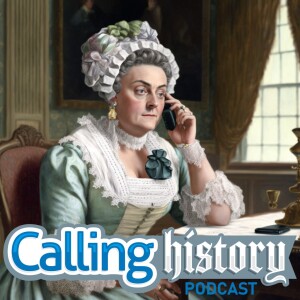
Wednesday Jan 25, 2023
Wednesday Jan 25, 2023
In Part 2 of the 1801 phone conversation with Abigail Adams, she’ll clear up a few things I’ve always wondered.
For starters, John Adams was short, round, and balding. Which of those features made her think, “Yep, that’s my guy.”?
Why did she think Thomas Jefferson was a terrible parent.
And last, her profound response to a question about the necessity of violence.
It is hard to say which of the Adam’s were intellectually superior. Fortunately, it doesn’t appear that this question was ever considered by either. Instead, they used their synergy to allow John to rise to the Presidency and thrive at a time when one leader was not suitable to fill George Washington’s shoes.
Start episode 2 now and join the conversation.
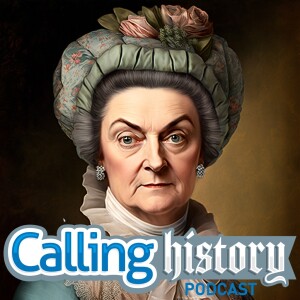
Wednesday Jan 18, 2023
Wednesday Jan 18, 2023
In 1801 Abigail Adams was enjoying the day at the family farm, Peacefield, when she received a phone call from the future …
In Abigail Adams time, a woman and her belongings were the property of her husband. Yet, despite women being marginalized in this time, you’ll hear:
How Abigail made a fortune investing the family’s money, even though women were not allowed to participate in financial transactions.
How Abigail threatened a women’s revolt after John Adams dismissed her letter, “Remember The Ladies.”
And what Abigail loved about France. (Hint: It wasn’t the people)
Abigail was the perfect combination of humble and thoughtful. It’s no wonder she was able to manage her obstinate, unpredictable husband and thereby make him better than he would have been on his own. By the end of this episode you’re going to understand why Abigail is so loved as a first lady.
Start the episode now and join the conversation.
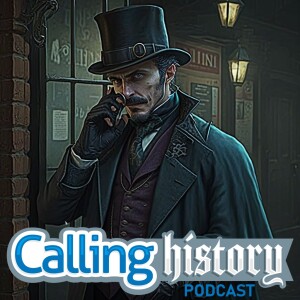
Wednesday Jan 11, 2023
Wednesday Jan 11, 2023
In Part 2 of the 1891 phone conversation with Louis Diemschutz, he will clarify several facts about the crime and mistakes that could have resulted in the team getting caught. In this episode you’ll hear about:
Why Diemschutz intentionally called the police to the murder he had just committed outside of his clubhouse.
Obvious mistakes that the police missed, that would have easily connected his crew to the crime.
And finally, why they cut one body up into pieces and spread them all over the city.
The Rippers gave the police so many clues and yet, somehow, they missed them all. One postcard sent by the Rippers had a picture of four men killing a woman with a knife. But I supposed once the media attached to the single Jack the Ripper story, that was all anyone could see. As this conversation ends, Louis makes one final threat that I will never forget.
Start episode 2 now and join the conversation.
This is the link to the Novel.
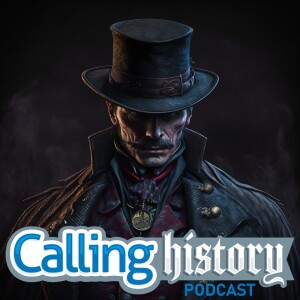
Wednesday Jan 04, 2023
Wednesday Jan 04, 2023
In 1891, Louis Diemschutz was at the International Working Men’s Educational Club preparing to leave London forever to protect a secret, when unexpectedly he received a call from the future …
Jack the Ripper was never caught by the police. When I asked him why, he will tell you over and over, “Because they were idiots.” Probably the greatest obstacle the police had was that they were looking for one man, instead of the four men who masterfully orchestrated a string of vicious murders. In this episode, you’ll learn:
Who the Rippers are and how they were handpicked based on their skills for planning and executing these gruesome murders in a way that they would never be forgotten.
Why a Russian Prince would commit so much effort to exposing the seedy White Chapel area of London.
And finally, you’ll hear some gory details about the murders from a man who was in the room.
As you progress through these episodes, you’ll understand the brilliance and the depravity of these horrific murders, all leading to a chilling threat at the end.
Start the episode now and join the conversation.

Wednesday Dec 28, 2022
Wednesday Dec 28, 2022
In Part 2 of the 1876 phone conversation with Mary Todd Lincoln she is going to clear up a few facts for us.
What did she see in Abraham Lincoln and why she called this tall lanky man her diamond in the rough.
Why and how close her husband was to duelling over her.
And finally, why did Abe keep going when she saw her baby fall out of the back of his wagon, and what she had to say about it.
After listening to this podcast, I think you’ll agree that Mrs. Lincolns flaws are very apparent. If she lived in this time, she would have thirty credit cards, and they would be maxed. Yet, there was so much good inside of her that could not be ignored. She is complex, confusing, interesting, and dangerous at times, but without her, Abraham Lincoln may have never been president.
Start episode 2 and join the conversation.
-----
Thank you, JoAnn F. Peterson, for your magnificent portrayal of Mary Todd Lincoln. You can learn more about JoAnn, her acting, singing, and amazing portrayals of Historic Women at: Www.joannpeterson.com, or contact her at Joannfpeterson@gmail.com. You can also listen to her as The Unsinkable Molly Brown on the podcast dated February 14, 2024.
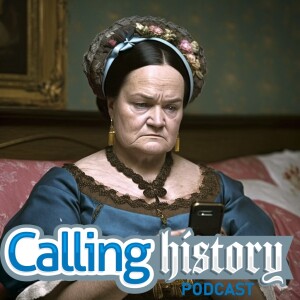
Wednesday Dec 21, 2022
Wednesday Dec 21, 2022
In 1876, Mary Lincoln had fled to France after her insanity trial, when she received a call from the future …
In modern times, Mary Lincoln's diagnosis would be bipolar. Although she is remembered as unpredictable and possibly insane, the truth is very different. She was educated, refined, and Abraham Lincoln's most trusted adviser, playing a pivotal role in helping him rise to the highest office. In this episode you’ll learn:
Why her son charged her with insanity and whether she thinks she is insane.
Why her family did not approve of Mr. Lincoln at all.
And finally, whether the spiritualist she frequented were able to connect her to Mr. Lincoln after his assassination.
As you listen to these episodes, you’ll see that there is a lot of good in Mary Todd Lincoln that would be easy to miss because the unpredictable side of her made better news headlines.
Start the episode now and join the conversation.
-----
Thank you, JoAnn F. Peterson, for your magnificent portrayal of Mary Todd Lincoln. You can learn more about JoAnn, her acting, singing, and amazing portrayals of Historic Women at: Www.joannpeterson.com, or contact her at Joannfpeterson@gmail.com. You can also listen to her as The Unsinkable Molly Brown on the podcast dated February 14, 2024.
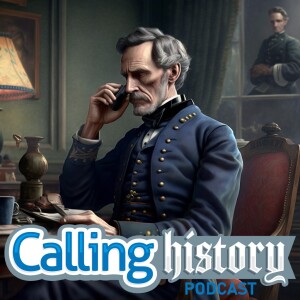
Wednesday Dec 14, 2022
Wednesday Dec 14, 2022
In Part 2 of the 1881 conversation with Jefferson Davis, he’s going to shock me by saying that George Washington was his hero. He’ll also explain:
What the phrases “sold down the river” and “overage” mean. Neither are good.
What he meant when saying, “The Confederacy died of a theory.”
And finally, how his thinking changed about slavery and the war, but not about the South’s right to Secede.
Jefferson Davis’s Wife Varina told her husband that, “The better side won.” Considering that they both grew up with slavery as a part of life, I’m impressed that they both were able to change their thinking at all.
Start episode 2 and join the conversation.
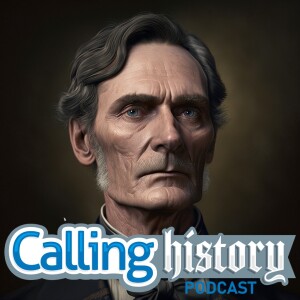
Wednesday Dec 07, 2022
Wednesday Dec 07, 2022
In 1881, while enjoying his retirement at Beauvoir, his home in Biloxi, Mississippi, Jefferson Davis received a call from the future …
On the surface, Jefferson Davis was the perfect person to lead the South in secession from the Union. Prior to the Civil War he served in the United States House and Senate. He understood government. His experience was invaluable because the South had to build a non-existent government from scratch. In this episode, you’ll learn:
How his trouble with authority at Westpoint resulted in some excess drinking that history referred to as “The Egg Nogg Riots”
How and why, he adopted a black child?
Whether or not he dressed up as a woman to escape capture.
And why Davis believed that secession was not only legal, but the right of the South.
Regardless of what you believe about the past, our history is both “history” and it’s “ours. I don’t agree with slavery any more than the way I feel we poorly treated the Native Americans, and I like our Union united. Even though Jefferson Davis didn’t share my beliefs, I’m thankful that he was willing to tell his side of the story and how those beliefs changed with age.
Start the episode and join the conversation.









